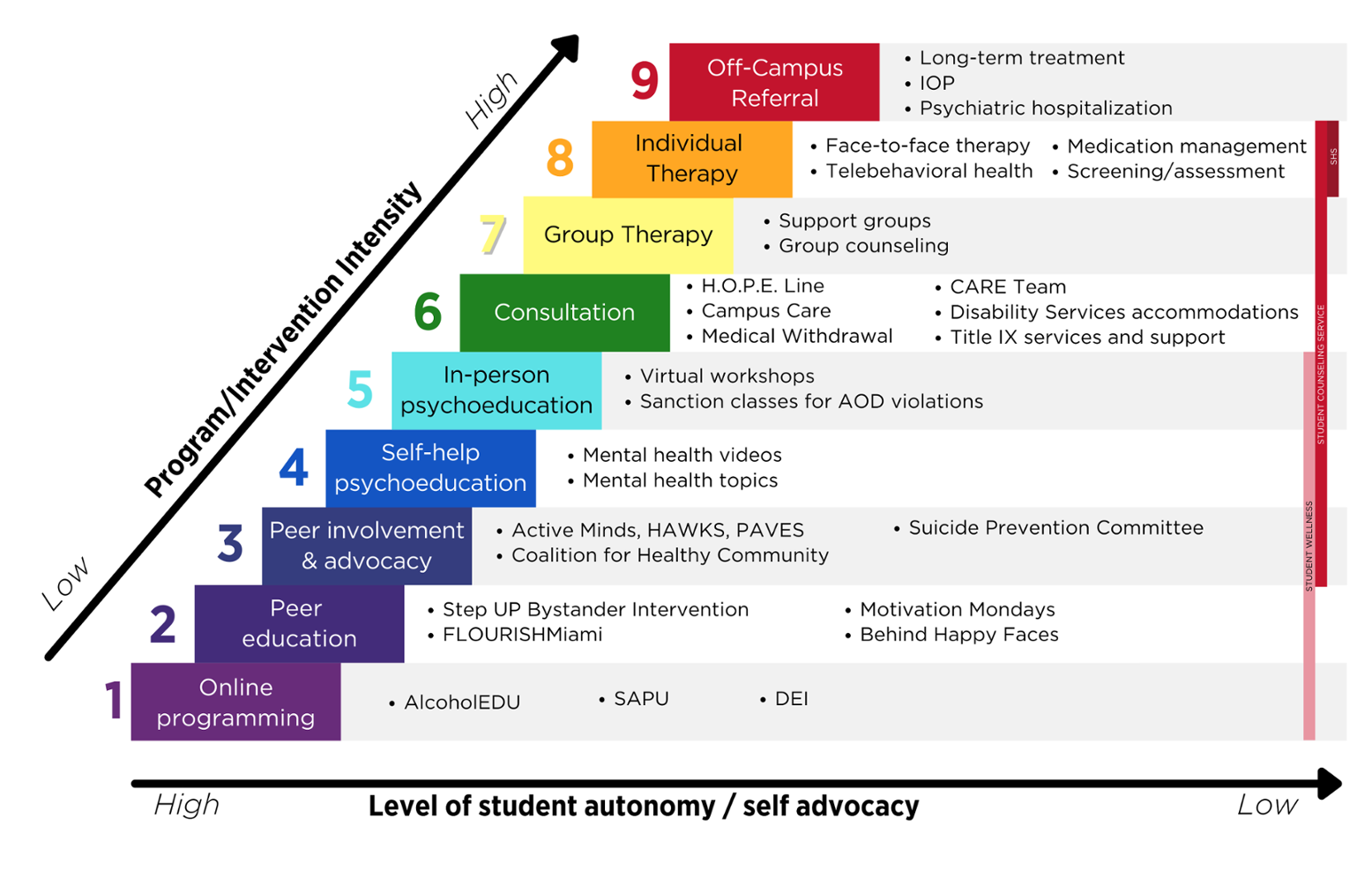Student Life Adopts a Stepped Care Approach to Mental Health

Nationally, and in the Miami community, the conversation around collegiate mental health seems ever-present. And for good reason; the national data around collegiate mental health is alarming. Data from the American College Health Association's annual survey in 2022 revealed that:
- 34% of students reported feeling nervous most of the time.
- 12% reported feeling hopeless most of the time.
- 41% reported that they received services at their university counseling center within the last 12 months.
Additionally, the JED Foundation (2020) reports that 56% of students are significantly concerned with their ability to care for their mental health.
Miami is not immune to these national trends. Student counseling service saw an 83% increase in the number of individual counseling appointments compared to ten years ago. There was a 52% increase in the number of individual clients in the 2021-22 year over the previous year. Miami’s office of the dean of students reports a 27% increase in the number of medical withdrawals and a 39% increase in the number of CARE team submissions in 2021 over 2019.
In response to these increasing needs, the Division of Student Life adopted a “stepped care” framework to organize Miami’s approach to student mental health care. This framework, adapted from Peter Cornish's Stepped Care 2.0 model (2020), is an evidenced-based, multi-staged approach to organizing the delivery of mental health care.
A stepped care framework aims to capture and promote the full range of mental health services offered. Students often assume their only option for support is individual counseling. The framework ultimately ensures that students engage the right level of service or support as their needs change over time.
“Using this framework as our philosophical guide, we organized all of our mental health interventions and services by level of intensity and level of autonomy,” said Steve Large, Psy.D, assistant vice president for health and wellness. "The beauty is that it allows us to assess our current resources and services while simultaneously identifying potential gaps or opportunities for enhancement.”
The framework also brings together offices that support student mental health. For instance, the office of student wellness focuses on the more educational and prevention-based initiatives (lower intensity, higher autonomy) while student counseling service is more involved on the other side of the services spectrum (higher intensity, lower autonomy).
Looking ahead, there is plenty of good news to share around student mental health at Miami. The recently adopted student mental health fee has expanded and enhanced our mental health efforts, including new prevention and education initiatives, individualized case management, and improved access to treatment options.
Additionally, Miami’s institutional taskforce on student, faculty, and staff mental health will conclude their work this semester. They will provide recommendations that address the mental health of our staff, students, and faculty.
“All of these efforts point to Miami’s distinct commitment to student mental health,” said Large. “The Miami community is special - in part because of this commitment, but also our valuing of authentic connection and honoring people’s journeys towards holistic wellness.”

Stepped Care Model Image Description
A stairstep chart starting at the bottom with level one and moving up and to the right to level nine. The x-axis of the chart is labeled "level of student autonomy / self advocacy" and ranges from high on the left to low on the right. The y-axis is labeled "program/intervention intensity" and starts low on the bottom up to high on the top. Levels are labeled and described below.
- Level 1: Online programming
- AlcoholEdu
- SAPU
- DEI
- Level 2: Peer Education
- Step UP Bystander Intervention
- FLOURISHMiami
- Motivation Mondays
- Behind Happy Faces
- Level 3: Peer involvement and advocacy
- Active Minds, HAWKS, PAVES
- Coalition for a Health Community
- Suicide Prevention Committee
- Level 4: Self-help psychoeducation
- Mental health videos
- Mental health topics
- Level 5: In-person psychoeducation
- Virtual workshops
- Sanction classes for AOD violations
- Level 6: Consultation
- H.O.P.E. Line
- Campus Care
- Medical Withdrawal
- CARE Team
- Disability services accommodations
- Title IX services and support
- Level 7: Group Therapy
- Support groups
- Group counseling
- Level 8: Individual Therapy
- Face-to-face therapy
- Telebehavioral health
- Medication management
- Screening/assessment
- Level 9: Off-campus referral
- Long-term treatment
- IOP
- Psychiatric hospitalization

